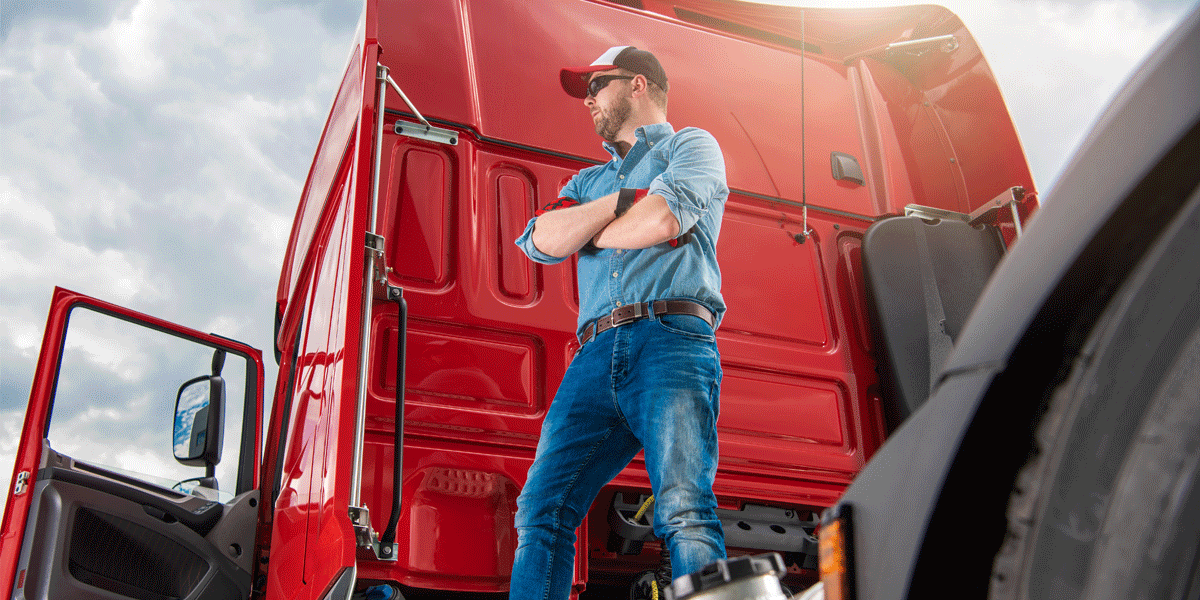Should You Become an Owner-Operator? 4 Things Every Truck Driver Must Consider
Samantha joined the Anderson Trucking Family in November of 2012 as a specialized driver manager and managed a fleet of mixed company and contractor drivers. In the spring of 2014, she transitioned to the driver administration department and began working in contractor services. While in contractor services, Samantha familiarized herself with all processes, procedures and information in regards to driver contracts, pay and settlements. She is currently the operations support manager and oversees both the contractor services department as well as the driver settlement department and leads both of her teams to ensure our drivers receive the highest level of service required to help navigate their accounts and settlements on a daily basis.
Revised November 14, 2025
Do you dream of having your business name on the side of your truck? Maybe on the side of a whole fleet of trucks?
Getting there isn’t as impossible as it seems. There are lease-purchase programs that can help you get into a truck with little money down and no credit check. But owning your own rig comes with serious responsibility. After all, it is a business.
As operations support manager at Anderson Trucking Service (ATS), my job is all about making sure that drivers feel supported financially. So, before you take the leap, it's important to know what you're signing up for and how to set yourself up for success.
Key Takeaways for Potential Owner-Operators
- With the right preparation, becoming an owner-operator can bring freedom, flexibility, and higher pay
- You take on a lot of financial responsibility, and the investment can be steep — as much as $100,000-$250,000
- You become more than a truck driver: you become a business owner
- You have to think very long-term
- While this guide is a helpful start, your best resource will be other drivers who have become owner-operators
1. Can You Handle the Financial Responsibility?
This is at number one for a reason: it's big. When you're a company driver, your carrier handles most of your costs (fuel, maintenance, permits, insurance), but as an owner-operator, those costs become yours. You can’t be a paycheck-to-paycheck sort of person and succeed as an owner-operator. You have to ask and be honest with yourself: are you ready and able to take these costs on? When thinking through the answer to that question, remember you'll have to budget for these things:
- Truck payment or lease: Whether you buy or lease, expect to invest thousands monthly
- Buying a semi is the equivalent of purchasing a small home, and the more equipment you buy (trailer, tarps, tools), the more responsibility you have
- Buying a semi is the equivalent of purchasing a small home, and the more equipment you buy (trailer, tarps, tools), the more responsibility you have
- Fuel: This adds up to be your biggest expense, but efficient driving and route planning can save you thousands
- Maintenance: You have to keep your truck in good working order, which means consistently setting money aside for preventative maintenance and unforeseen breakdowns (they happen!)
- Insurance and permits: You'll handle your own insurance (truck, medical, and life) as well as setting up a retirement account
- Taxes: Taxes aren't automatically taken out of your paychecks, so you'll need to set some earnings aside for tax time
- You can also make quarterly tax payments
Pro Tip: Build a three-to-six month reserve fund before going independent. That way, you'll be set up for slow weeks or major repairs.
2. Start Thinking Like an Owner, Not Just a Driver
As an owner-operator, you won't have a dispatcher feeding you options. You'll be booking loads and negotiating rates yourself, which means taking on both the freedom and the risk of running a trucking business.
It takes discipline, and staying on top of the freight market is crucial. Tempting as it may be (and it will be), it isn't just about grabbing the highest-paying load. It's a bit like a game of chess. You need to plan in advance and know which lanes will set you up for your next move to keep you rolling and getting paid. If you're a driver who needs that push from a dispatcher, that's fine. This just probably isn't the move for you.
Alright, so you're a pro at booking freight and being your own boss. Things are moving along nicely. But then — gasp! — something goes wrong. A customer cancels a load while you're already on your way. Or you arrive to the shipper and find that the freight is delayed, or worse, missing. Handling these kinds of issues (and ensuring you still get paid) happens behind the scenes at carrier companies, but as an owner-operator, this responsibility falls entirely on you. Without the right awareness, strategy, and communication skills, that means lost income.
And then there's the risk of unpaid changes to your load. Say you book a shipment that had one stop. You pick it up only to have the customer tell you that — surprise! — another stop was added and yeah, it's completely out of your way. Okay, you think. Surely, they'll pay me for this extra stop. Nope! That's where a carrier company would come in and help advocate for you. They have established trusting relationships, and leverage, with customers, which is harder and takes longer to build up on your own.
Becoming an owner-operator is not all "doom and gloom," but the challenges and risks are very real. The more prepared you are for them up front, the better you can plan and the more successful your trucking business will be. Remember: the greater the risk, the greater the reward.
3. What Kind of Owner-Operator Do You Want to Be?
Truck drivers become owner-operators for one main reason: freedom. But what kind of owner-operator do you want to be? You have several paths to choose from, each with their own levels of responsibility and requirements. Let's get into them.
- Asset-Based Owner-Operator: Operate your own truck while hauling freight for a single trucking company — a good first step for new owner-operators.
- The company provides you with a dispatcher whose job is to get you consistent freight opportunities. But this means having to follow the company's policies and standards.
- It's similar to being a lease driver, but without the truck payment.
- The company provides you with a dispatcher whose job is to get you consistent freight opportunities. But this means having to follow the company's policies and standards.
- Lease Under a Company's Authority: Run under a company's established authority, but with the freedom to choose the loads you want from load boards. For some, this is the best of both worlds. This is the preference here at ATS.
- You're mostly on your own, though the company provides backup support for things like paperwork and payments.
- You'll likely still need to follow the company's regulations and standards.
- You're mostly on your own, though the company provides backup support for things like paperwork and payments.
- Operate Under Your Own Authority: Doesn't get much freer than this. But this freedom comes with the highest level of responsibility.
- You decide how to run every part of your business, which means you have full control over freight, operations, and equipment.
- This means you're not just responsible for the actual driving, but for the safety, accounting, and dispatch departments as well. These administrative duties take time, and time is money.
- Still subject to Department of Transportation (DOT) regulations.
- As with any independent business, it can take longer to start seeing profits than with an established company.
- You decide how to run every part of your business, which means you have full control over freight, operations, and equipment.
Our suggestion? Talk to other drivers who have made the leap to owner-operator. What path did they choose? Why? What challenges have they had to overcome and what is their day-to-day like?
4. Do You Work Well Independently?
This probably seems like an obvious question, but it's one that many drivers skip when deciding if becoming an owner-operator is the right move. Many like to believe they can succeed — even be better off — without direction. Over the years, I've worked with plenty of truck drivers who insist they work well independently and don’t need a supervisor to stay on track.
Results are mixed.
There are definitely those who don't just do well, but thrive, under a hands-off supervisor. These are the innovative self-starters who can get things done with little to no guidance. And this is what you need to be if you want success as an owner-operator. You're carving your own path, so you have to be driven, motivated, and comfortable with that level of independence.
There’s a difference between wanting freedom and working for it. You may want freedom, but are you willing to work for it?
When you own your truck, you answer only to yourself. You decide what to do and when you want to do it. You can:
- Take your truck to any shop you want (or fix it yourself)
- Customize your truck with chrome, paint, decals, or a fully personalized interior
- Make the cab your "home away from home"
- Display your business name proudly on the side
- Bring your partner, child, or pet with you on the road
For many drivers, this is the best feeling in the world. It's the freedom to be your own boss and build a legacy. But it's something that takes a lot of hard work and discipline to achieve.
You have to make responsible decisions, even when no one is watching. You have to cover insurance payments, fuel costs, and other business expenses. But if organized well and handled responsibly, you may also have the luxury of running freight just two days a week or taking a month off when you feel like it. It's the ultimate business owner experience.
Last Stop: So, Is Being an Owner-Operator For You?
Just know: there is no shame in choosing not to own a truck. It's not for everyone, and that's okay.
Being an owner-operator comes with a steep learning curve. It's a lot of work. Building a business is hard enough, but then you have to maintain it to stay sustainable and profitable. You have to think very long-term.
But if, after reviewing this information, you're ready to take the next step, ATS is seeking owner-operators interested in running under our authority. Enjoy the freedom to choose your own freight while getting the support you need from a company.
Reach out to one of our driver consultants today to ask all of your questions, and to learn more about contracting with us as an asset driver.



